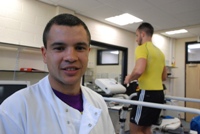Is dairy colostrum the key to Olympic success?

Dr Glen Davison
24 March 2011
Research conducted at the Department of Sport and Exercise Science at Aberystwyth University has formed the basis of an investigation into natural ways to enhance athletic performance, and has shown that bovine colostrum* can massively reduce gut permeability – otherwise known as ‘leaky gut syndrome.’
The findings, published in the March issue of the American Journal of Physiology-Gastrointestinal and Liver Physiology, could have positive implications not just for athletes but also for sufferers of heatstroke.
The project looked at athletes who were asked to run for 20 minutes at 80 per cent of their aerobic maximum, and at the end of the exercise, conducted at Aberystwyth University’s state of the art Sport & Exercise Science laboratories, changes in the subject's gut leakiness were measured using a urine sample – also determined were changes in the athletes’ core temperature.
Under standard conditions, gut leakiness had increased by 250 per cent and temperature had risen by up to 2 degrees. However, when the group were given a drink of dairy colostrum for two weeks before the trial, the rise in gut leakiness was reduced by about 80 per cent, despite the same effort and temperature rise.
Gut disorders induced by exercise are common in runners – the body’s response to increased permeability is to clear the gut contents, giving rise to symptoms such as diarrhoea to avoid toxins from gut organisms entering the bloodstream, as these can contribute to symptoms associated with heatstroke and can result in damage to internal organs.
The research, in collaboration with a group led by Ray Playford, Professor of Medicine at Barts and The London School of Medicine and Dentistry, also identified changes in gut barrier function in laboratory studies: gut cells were cultured at normal 37 degrees body heat and at 39 degrees to replicate the temperature after exercise. The death rate of gut cells was much increased at the higher temperature, yet when colostrum was added to the culture medium the rise in cell death rate was reduced by two thirds.
Professor Ray Playford said: “Athletes’ performance can be seriously diminished due to gut symptoms during heavy exercise. We have been looking at natural approaches to reduce this problem as the range of products that athletes can legitimately take is very limited. Our findings suggest colostrum may have real value in helping our athletes perform".
“In addition, extremes of temperature and exercise are often suffered by armed forces in desert war scenarios and can result in heat stroke which is life threatening. Based on our results to date, our research group is also exploring products that may be useful for protecting soldiers in life threatening situations such as these.”
The project represents the first collaboration between the Department of Sport and Exercise Science and Barts and The London School of Medicine and Dentistry, and its success bodes well for future projects.
Dr Glen Davison of Aberystwyth University, who coordinated the research at Aberystwyth, said: "We are incredibly proud that Professor Playford, and his world-leading team, chose to work with us for our expertise in Sport & Exercise Science. We think that this shows that the Department at Aberystwyth is well recognised for Sport and Exercise Science research.
“The findings from this study add to other work from the Department showing that bovine colostrum supplementation can have beneficial effects on the immune system and illness in athletes as well as helping to protect the gut. We are now in the process of conducting more investigations and continuing our work with Professor Playford to design rigorous scientific studies to provide more information on this topic" he added.
*Bovine colostrum (‘early milk’) is the initial milk produced by cows, usually obtained within the first 48 hours after giving birth. It is commercially available throughout the world and usually obtained from organic dairies. Like ‘normal’ milk, it contains a rich source of nutrition, both in terms of macronutrients and micronutrients, but is also abundant in bioactive components including immune, growth and antimicrobial factors.
Further information: Dr Glen Davison



